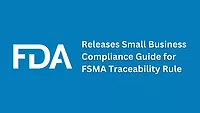FDA Delays FSMA 204 Traceability Rule Compliance Date by 30 Months

Image credit: Freepik
The U.S. Food and Drug Administration has delayed the compliance date for its Food Traceability Final Rule, fulfilling Section 204(d) of the Food Safety Modernization Act (FSMA 204), by 30 months. The compliance date was originally set for January 20, 2026.
Congress required FDA to enact a Food Traceability Final Rule as part of FSMA, which was passed with bipartisan support in 2010. FSMA directed FDA to propose recordkeeping requirements for certain “high-risk” foods no later than January 2013. When FDA failed to propose the recordkeeping requirements by the deadline, the Center for Food Safety sued the agency, leading to a federal court order mandating that it propose requirements by September 2020 and finalize the rulemaking process by November 2022—which FDA successfully achieved.
Foods subject to the final rule requirements appear on the Food Traceability List (FTL). At the core of the final rule is a requirement that individuals who manufacture, process, pack, or hold food on the FTL maintain traceability records including Key Data Elements related to Critical Tracking Events. When requested by FDA for the investigation of food safety incidents, covered firms will be required to provide information to the agency within a reasonable timeframe.
FDA’s Reasoning: Industry Isn’t Ready
FDA says it remains committed to implementation of the Food Traceability Final Rule, as it will allow for faster identification and removal of potentially contaminated food from the market, resulting in fewer foodborne illnesses and deaths. The agency also says it does not intend to amend the requirements of the final rule. Rather, the compliance date was extended to “afford covered entities the additional time necessary to ensure complete coordination across the supply chain in order to fully implement the final rule’s requirements.”
The agency’s reasoning for extending the compliance date is that “even those few entities who are well positioned to meet the final rule’s requirements by January 2026 have expressed concern about the timeline, in part because of their reliance on receiving accurate data from their supply chain partners, who are not similarly situated,” FDA states that, because FSMA 204 requires coordination between different entities spanning the supply chain, “to achieve the full public health benefits of the final rule, all covered entities must be in compliance,” and therefore, all regulated sectors must be granted more time to fully implement the final rule’s requirements.
FDA intends to use the extended time period to continue the agency’s work with stakeholders, including participation in cross-sector dialogue to identify solutions to implementation challenges, and by continuing to provide technical assistance, tools, and other resources to assist industry with implementation.
The agency will formally extend the compliance date using appropriate procedures at a later time, including publishing a proposed rule in the Federal Register.
Looking for quick answers on food safety topics?
Try Ask FSM, our new smart AI search tool.
Ask FSM →
Consumer Protection, Food Science Groups Express Disapproval
Food industry watchdog group Consumer Reports has expressed its disapproval of FDA’s decision to delay FSMA 204 compliance, saying, “This decision is extremely disappointing and puts consumers at risk of getting sick from unsafe food because a small segment of the industry pushed for delay, despite having 15 years to prepare. Many retailers have already said that they expect their suppliers to follow the rule’s requirements in advance of the compliance date, but today’s announcement may interfere with this progress.” Consumer Reports has been urging FDA to resist industry pressure to delay the Food Traceability Final Rule alongside the Consumer Federation of America's Safe Food Coalition, the Center for Science in the Public Interest (CSPI), and other notable advocacy organizations.
The Safe Food Coalition commented, "The decision to delay FDA’s traceability rule for 30 months will put consumers at higher risk of getting a foodborne illness, and undermine progress towards the goals laid out in the Make America Healthy Again agenda. Much of industry has already invested in complying with the rule, but a few holdouts sought delay. Rewarding these narrow special interests will undermine efforts across the food industry to keep better track of foods, and make it harder for responsible companies and investigators to protect consumers from contaminated food." For a discussion with Thomas Gremillion, J.D., M.A, the Director of Food Policy at the Consumer Federation of America, in which he shared concerns about efforts to delay or weaken FDA's Food Traceability Final Rule and reviews industry's ability to comply by the January 2026 deadline, listen to Episode 183 of the Food Safety Matters podcast here.
In the past, responding to earlier legislative efforts launched by Congress to delay FSMA 204 implementation, CSPI remarked, "Responsible members of the food industry are already working with FDA to comply with traceability requirements... that effort [would] go to waste by turning the clock back on this very sensible and necessary policy.” CSPI also denounced the recent FDA decision to delate the Food Traceability Final Rule, stating, “In the year 2025, the U.S. has access to some of the best technology in the world for keeping track of products moving through the food system, yet we still have a hard time figuring out where a bag of lettuce came from and getting contaminated peanut butter off the shelves. [FSMA 204], when fully implemented, will shed new light on the inner workings of our food system. Unfortunately, this delay will only serve to keep the public in the dark.”
Speaking to industry, the Institute of Food Technologists (IFT), a nonprofit forum for food science professionals and technologists, stated, "While we are disappointed by the 30-month delay in compliance with FDA’s Food Traceability Final Rule, we acknowledge the complexities of implementing a regulation with global impact. However, public health must remain a top priority. The persistence of foodborne illness and recalls underscores the need for food industry stakeholders to invest in traceability and advance their efforts quickly, regardless of regulatory timelines. We encourage food industry stakeholders to use this time to collaborate across the food system and adopt best practices that strengthen traceability."
Industry Stakeholders' Wishes are Granted
In contrast, some industry stakeholders have been pushing for a delay of the Food Traceability Final Rule compliance date and welcome the new decision. Previously, FMI, the Food Industry Association, called the rule "overly complex" and its implementation “so burdensome as to not be achievable given currently available technology and other resources.” In light of the new announcement from FDA, FMI not only applauded the extension of FSMA 204, but criticized the final rule in its current form, stating, "While additional time is critical for efficient implementation across all sectors, we also strongly believe FDA should reexamine certain aspects of the rule to provide flexibility for the industry to improve traceability without unnecessarily burdening the supply chain and increasing food costs to consumers."
Additionally, the National Grocer's Association commented, "Disproportionately impacting smaller grocers, the traceability rule’s original timeline was nearly impossible to meet across the vast and dynamic food system. It quickly added exorbitant costs and operational complexity, threatening grocers’ ability to serve their communities effectively."
ReposiTrak, a traceability solutions provider, also lauded FDA's decision to delay the FSMA 204 compliance date, saying, "Traceability requires not just data, but good data. Because traceability is complex, and the biggest supply chain collaboration in the history of the food industry, every trading partner needs to learn how to collect, analyze, manage, and share that quality data so that the next participant in the supply chain doesn’t have a garbage-in-garbage-out problem."
GS1 US, a neutral, nonprofit standards organization, said it "...appreciates the acknowledgement from FDA that more time is needed for many," commenting, "This extension for industry compliance allows GS1 US and our members more time to work toward changes [that are] needed, and [to work] through pilot efforts to help them meet the requirements of the rule by leveraging GS1 Standards for interoperability and efficient sharing of data up and down the supply chain." For a discussion about the challenges industry is facing in meeting the requirements of the Food Traceability Final Rule, progress that has already been achieved across the supply chain, and actionable steps for companies to advance their traceability journeys, listen to Food Safety Matters podcast Episode 186 with Lucy Angarita, Director of Food Supply Chain visibility at GS1 US, here.









